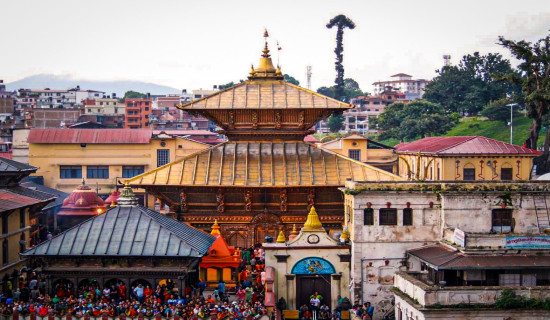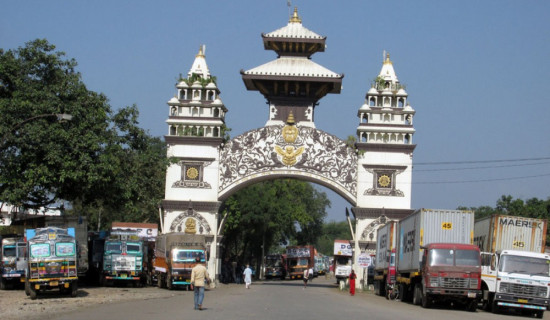- Sunday, 15 February 2026
Why Democracy Lacks Trust And Respect
Two parents of the same age met and offered to marry their college boy and girl. The father boasted about his son: "He needs no job; I have millions!" But the proposal was rejected because the girl didn’t like the boy, who had an interest in politics.
This anecdote prompted me to investigate why, after all, politics is a toxic phrase and why a few politicians never give up! The answers were many. One answer is the supremacy of the minority over the majority. First, the majority, who know freedom at first, follow the process of the ballots to elect the minority; the minority then gains power. In other words, the minority now makes the government according to the wishes of the majority. In Nepal, ironically, respect for the government seems to be falling because the people’s fear seems to be growing for various reasons. This fear is the opposite of freedom and is not what democracy is. Fear does not consist of the alien invasion, nuclear devastation, border management, nuclear threats, Bagmati riverbank squatters, or garbage crises in Kathmandu. Some other categories of fear are not there, such as hunger, loneliness, darkness, open space, security, dispossession, and displacement.
A combination of these, however, can pose a risk to democracy. Who are the fear mongers who are so loud, and who are the fear consumers who are quiet? Obviously, fear mongers are in the minority, and fear consumers are in the majority! What does it then intend? At first, it says that all people who follow the process of democracy are equal, but when in power, it says that some people who become the government are more than equal, as George Orwell wrote in Animal Farm. The powerful minority then becomes a victim of the suspicion and distrust of the powerless majority. Suspicion is like a dark snake suddenly seen in the dark night; it slithers into further emotions of fear and distrust. It instantly breeds cruelty. No wonder the snake is crushed to death before it bites! Thus, our democracy drives more fear than respect. The dilemma here is: do the minority enjoy respect for truth or for fear?
What is popularity?
The ideal of a statesman in a government is simple: a leader who inspires and earns the trust of the people by being optimistic, honest, transparent, and committed. Such a leader is not born with these qualities but cultivates them through hard work and dedication. They have a clear vision and a plan to achieve it, and they win the hearts and minds of the people. The people, in turn, admire and respect their leaders and display their portraits proudly in their homes. Such leaders do not use sweet words or deceit to manipulate the people, nor do they succumb to negative emotions like greed, envy, lust, or hatred. They do not see themselves as superiors or celebrities, but as humble servants of the people.
Nepal’s politics have been infested by conflicts, corruption, and injustice that have damaged its image. As a result, politics is mostly a bitter and unattractive field for the saints, but a tempting and profitable one for the scamps. Rather than learning from the mistakes of the past, politicians seem to follow the worst examples of greedy and dishonest leaders. They hide their iron fists under velvet gloves, as Napoleon advised, and smile insincerely while pursuing their selfish ambitions. This has created a wide gap between the political elites and the basic needs of the people.
Around these problems, democracy has suffered a loss of trust and appeal in the past decades. People blame the leaders for abusing their power, engaging in corruption, focusing only on elections, influencing the courts, and allowing criminals into politics. As the anti-incumbents bring controversy and raise questions, it is ironic to hear the government followers and the media praise the constitution handlers amidst a country facing many challenges and shortcomings.
Monitory or monetary?
The country is now split into two groups: a small minority of rulers and a large majority of followers who are easily swayed. Politics is a closed club for a few powerful figures who keep rotating and retaining their positions. They do not fade or disappear, but who is to blame? The blame lies first with the voters, who are influenced by the monetary charisma of the candidates. The rule of monarchy came to an end but unfortunately did not usher in a new era of political awareness among the voters. Nothing seems to change, neither the government, the opposition, nor the voters. The only sign of discontent is on social media platforms like Facebook and Twitter, where people express their frustration. There are also frequent protests on the streets and in the parliament, but they seem to have little impact beyond attracting media attention. The recent party elections show some hope in the loud monitory role of the grassroots since new parties and faces have come to the parliament and some old party faces have been replaced. However, there is still doubt about these faces in power. If they continue to challenge and swell up their numbers in the future, they might be able to test and change the leadership like a failing student appearing for a remedial exam.
The voters should also have the courage to reject the same candidates and try someone new. They should realise that voting for the same person repeatedly is a misuse of their power, not like watching the same actor in different movies. The same person in power for too long may become arrogant and say, "Some worship God and some worship money, but I worship the chair I sit on." The second president of India, Dr. Radhakrishnan, refused to run for a second term and said, "Public men and beauty queens are never aware of their declining powers." More recently, the New Zealand prime minister, Jacinda Ardern, who is under 40, stepped down, saying, "No longer enough in the tank," after she had dealt with several crises in her term. Similarly, the UK and Japan have had short tenures of prime ministers, sometimes less than two years, without any major conflict or scandal.
The key question we face is: how can we make politics more attractive and effective? Democracy and its liberal values are not under threat, but the way we pursue our shared goals through politics needs to be improved. Our trust in democracy depends on the quality of our political culture, electoral system, constitutional framework, and civic education. The efforts of the bureaucracy, the media, independent experts, and intellectuals are prominent in these aspects.
(Baral is a retired lecturer of English.)





-square-thumb.jpg)











